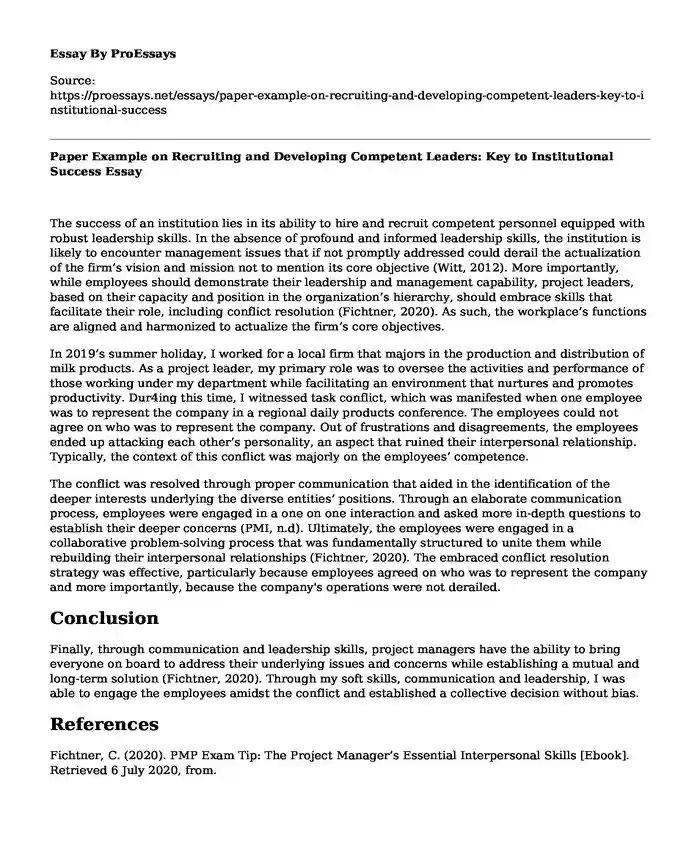The success of an institution lies in its ability to hire and recruit competent personnel equipped with robust leadership skills. In the absence of profound and informed leadership skills, the institution is likely to encounter management issues that if not promptly addressed could derail the actualization of the firm’s vision and mission not to mention its core objective (Witt, 2012). More importantly, while employees should demonstrate their leadership and management capability, project leaders, based on their capacity and position in the organization’s hierarchy, should embrace skills that facilitate their role, including conflict resolution (Fichtner, 2020). As such, the workplace’s functions are aligned and harmonized to actualize the firm’s core objectives.
In 2019’s summer holiday, I worked for a local firm that majors in the production and distribution of milk products. As a project leader, my primary role was to oversee the activities and performance of those working under my department while facilitating an environment that nurtures and promotes productivity. Dur4ing this time, I witnessed task conflict, which was manifested when one employee was to represent the company in a regional daily products conference. The employees could not agree on who was to represent the company. Out of frustrations and disagreements, the employees ended up attacking each other’s personality, an aspect that ruined their interpersonal relationship. Typically, the context of this conflict was majorly on the employees’ competence.
The conflict was resolved through proper communication that aided in the identification of the deeper interests underlying the diverse entities’ positions. Through an elaborate communication process, employees were engaged in a one on one interaction and asked more in-depth questions to establish their deeper concerns (PMI, n.d). Ultimately, the employees were engaged in a collaborative problem-solving process that was fundamentally structured to unite them while rebuilding their interpersonal relationships (Fichtner, 2020). The embraced conflict resolution strategy was effective, particularly because employees agreed on who was to represent the company and more importantly, because the company's operations were not derailed.
Conclusion
Finally, through communication and leadership skills, project managers have the ability to bring everyone on board to address their underlying issues and concerns while establishing a mutual and long-term solution (Fichtner, 2020). Through my soft skills, communication and leadership, I was able to engage the employees amidst the conflict and established a collective decision without bias.
References
Fichtner, C. (2020). PMP Exam Tip: The Project Manager’s Essential Interpersonal Skills [Ebook]. Retrieved 6 July 2020, from.
PMI. PMI Ethical Decision-Making Framework [Ebook]. Retrieved 6 July 2020, from.
Witt, J. (2012). How to Resolve Conflict - Project Management [Video]. YouTube; Project Management Videos.
Cite this page
Paper Example on Recruiting and Developing Competent Leaders: Key to Institutional Success. (2023, Sep 25). Retrieved from https://proessays.net/essays/paper-example-on-recruiting-and-developing-competent-leaders-key-to-institutional-success
If you are the original author of this essay and no longer wish to have it published on the ProEssays website, please click below to request its removal:
- Research Paper on Single-Parent Families and Effects on Children
- Research Paper on Leadership and Management in Organizational Psychology
- Essay Sample on Strategic Management: Achieving Goals & Objectives for Optimal Performance
- Essay Sample on Poor Team Performance: Causes and Solutions
- Essay Sample on Motivating Operations
- Right to Refuse Unsafe Work: Exploring Strengths & Limitations - Research Paper
- Latino Presence in the US: History, Socialization, and Representation - Essay Sample







